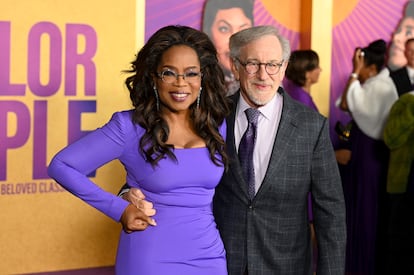Oprah Winfrey returns to TV with controversial special on obesity: ‘Making fun of my weight was national sport’
The businesswoman presented a special on diets and drugs such as Ozempic, which she previously criticized and now, prudently, embraces: ‘Let’s stop shaming other people for being overweight or how they choose to lose or not lose weight’


Years ago, Oprah Winfrey stopped being the queen of morning television. In May 2011, after a quarter of a century on The Oprah Show, she said goodbye to her millions of viewers to focus on other work, such as a new TV channel and a media empire complete with magazines, film productions (such as the recent The Color Purple) and reading clubs. She only comes back to TV for big occasions, like when she interviewed Prince Harry and Meghan Markle, Duke and Duchess of Sussex, three years ago, or when she appeared Monday night to talk about herself and a growing concern for the U.S. population: weight. More than 40% of the country’s adult population suffers from obesity, and by the end of this decade, the figure will rise to 50%. But Winfrey’s special about weight — her own and that of her fellow citizens — has received both applause and criticism.
The show Shame, Blame and the Weight Loss Revolution was given a prime time slot at 8 p.m. on Monday, which meant that the latest episode of The Bachelor was pushed back to 9 p.m. In addition to interviewing several guests who had gained or lost pounds, she also talked about her own journey. Winfrey has always spoken openly about her weight, which has marked her career. On Monday’s show, she explained that her perception of weight had changed over time, going from a purely aesthetic issue (in 2008 she regretted weighing more than 200 pounds, and said she felt “like a fat cow”) to a question of health, wellbeing and even for the “brain.”
On Monday night, Winfrey was once again the presenter that so many remembered, bringing together personal stories, interviews with experts and also talking about her own suffering on set. “For 25 years, making fun of my weight was national sport,” she said. “I wanted to do this special for the more than 100 million people in the United States and the over 1 billion people around the world who are living with obesity. Maybe that’s you or maybe that’s somebody you love.”
The fact that Winfrey has returned to TV with a special about weight is an indication of how important the issue has been for her. But it can also be seen as a way for the billionaire businesswoman to justify her use of weight-loss drugs, which she initially criticized, calling them “the easy way out.”
Today, her point of view has changed. “In my lifetime I never dreamed we would be talking about medicines that would be providing hope to people, like me, who have struggled for years with being overweight or with obesity,” said Winfrey. “I come to this conversation with the hope that we can start releasing the stigma and the shame and the judgment — to stop shaming other people for being overweight or how they choose to lose or not lose weight — and more importantly to stop shaming ourselves.”
On the verge of tears, Winfrey acknowledged that it was difficult for her to understand that obesity was a disease and that when she understood this she felt true relief: “When I tell you how many times I have blamed myself. You think, I’m smart enough to figure this out and then to hear all along it’s you, fighting your brain.”
Winfrey also defended and recognized people who feel “healthy and happy” without being thin, who only exercise and diet to lose weight and who use specific medication: “There is space for all points of view,” Winfrey said at the end of the program. “Let’s stop the shaming and blaming. There’s no place for it.”
“I don’t know if there is another public person whose weight struggle has been exploited as much as mine,” she said at a recent event in New York.
Last December, Winfrey talked to People magazine about her weight loss journey and finding a healthier path. She said she hikes three to five miles every day, drinks a gallon of water a day, has dinner no later than 4 p.m. and also receives help from medication. In other words, she has started taking a weight loss drug, such as Ozempic (from Novo Nordisk), although she did not specify the brand, nor whether she is still undergoing treatment. “It’s not just one thing, it’s multiple things,” Winfrey said.
On Monday, Winfrey’s good friend Whoopi Goldberg, while discussing the program, announced that she takes Mounjaro, the blockbuster drug from the pharmaceutical company Lily.

For years, Winfrey has been open about her battle with weight and has tried to help people struggling with the same problem by actively participating in companies, such as WeightWatchers. In 2015, she bought 10% of the company and now, almost a decade later, she has sold her shares, donating the proceeds to the National Museum of African American History.
Winfrey also decided to step down from the company’s board. Last week, she told Jimmy Kimmel’s late-night show that the decision to leave the board was prompted by her special on weight. “This special was really important to me, and I wanted to be able to talk about whatever I want to talk about,” Winfrey said. “And WeightWatchers is now in the business of being a weight-health company that also administers drug medications for weight. I did not want to have the appearance of any conflict of interest.”
In 2023, WeightWatchers bought Sequence, a prescription weight health program, which has seen a rise in subscribers but not, so far, a rise in revenue.
For now, it seems the Winfrey TV special is a one-off, an opportunity for her return to talk about a timely topic that has been central to her life for decades. With an estimated fortune of $2.8 billion, there’s no financial incentive to go back to TV. What’s more, not everyone was pleased about the special. The schedule change of The Bachelor outraged many viewers. Some of them accused the presenter of sneaking into prime time to broadcast “a long covert Ozempic ad” and “an infomercial for pharmaceutical companies.”
Sign up for our weekly newsletter to get more English-language news coverage from EL PAÍS USA Edition
Tu suscripción se está usando en otro dispositivo
¿Quieres añadir otro usuario a tu suscripción?
Si continúas leyendo en este dispositivo, no se podrá leer en el otro.
FlechaTu suscripción se está usando en otro dispositivo y solo puedes acceder a EL PAÍS desde un dispositivo a la vez.
Si quieres compartir tu cuenta, cambia tu suscripción a la modalidad Premium, así podrás añadir otro usuario. Cada uno accederá con su propia cuenta de email, lo que os permitirá personalizar vuestra experiencia en EL PAÍS.
¿Tienes una suscripción de empresa? Accede aquí para contratar más cuentas.
En el caso de no saber quién está usando tu cuenta, te recomendamos cambiar tu contraseña aquí.
Si decides continuar compartiendo tu cuenta, este mensaje se mostrará en tu dispositivo y en el de la otra persona que está usando tu cuenta de forma indefinida, afectando a tu experiencia de lectura. Puedes consultar aquí los términos y condiciones de la suscripción digital.








































